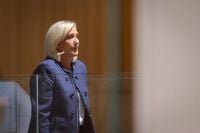On March 31, 2025, Marine Le Pen, the head of the Rassemblement National (RN) parliamentary group, faced a significant legal setback when a Paris court sentenced her to immediate ineligibility for five years due to her involvement in a case concerning the misuse of European parliamentary funds. In a reaction that echoed throughout the political landscape, Le Pen condemned the ruling as a "political decision" and a "dark day for our democracy." She reaffirmed her aspirations for the 2027 presidential election and called for a swift appeal hearing, insisting that she would not be eliminated from the political arena.
During a television interview on TF1, Le Pen expressed her outrage, stating, "Judges have implemented practices that we thought were reserved for authoritarian regimes." This comment highlighted her belief that the judicial system was being weaponized against her and her party. The court's president justified the ineligibility ruling by citing the severity, systematic nature, and duration of the offenses, as well as the significant amount of funds misappropriated, which totaled approximately €4.4 million.
Le Pen's conviction came as part of a broader investigation into alleged fictitious jobs held by parliamentary assistants associated with the RN. The court found that between 2004 and 2016, the party had engaged in a scheme to use European Parliament funds to pay assistants who were, in reality, working for the party. The court also imposed penalties on 23 other individuals involved, with the RN itself facing a fine of €2 million.
Despite the ruling, Le Pen remained defiant. "I will not let myself be eliminated in this way," she stated, dismissing the idea of stepping back in favor of Jordan Bardella, the current president of the RN. She described him as a "formidable asset" and expressed hope that they would not need to utilize his potential leadership sooner than necessary.
Jordan Bardella echoed Le Pen's sentiments, asserting that "French democracy is being executed" and called for a peaceful mobilization among supporters. He initiated a petition on the party's website to rally public support against what he characterized as judicial overreach.
The political ramifications of Le Pen's conviction are profound. A poll published just days prior indicated that she was a leading candidate for the upcoming presidential election, with 34 to 37% of voting intentions in the first round. However, the legal timelines suggest that her appeal process may not conclude until late 2026, just months before the election, leaving her candidacy in jeopardy.
International reactions to Le Pen's conviction were swift. Support poured in from various far-right figures across Europe. The Kremlin criticized the ruling as a violation of democratic norms, while Hungarian Prime Minister Viktor Orban expressed solidarity with Le Pen, declaring, "I am Marine!" In the United States, former President Donald Trump compared her situation to his own legal challenges, lamenting that she could no longer run for office despite leading the race. Trump remarked, "It's a very big story," emphasizing the gravity of her ineligibility.
Elon Musk also weighed in, denouncing what he termed an "abuse of the judicial system" and predicting potential backlash against the ruling. Meanwhile, former Brazilian President Jair Bolsonaro condemned the conviction as a form of persecution.
Domestic reactions varied, with Prime Minister François Bayrou expressing that he was "troubled" by the judgment. In contrast, Jean-Luc Mélenchon, leader of La France Insoumise, argued that the decision to remove an elected official should rest with the electorate, not the judiciary. He suggested that such a significant action warrants a referendum, emphasizing the need for public involvement in democratic processes.
The French Superior Council of the Magistracy (CSM) released a rare statement expressing concern over threats made against the judges involved in Le Pen's case. The first president of the Paris Court of Appeal condemned these threats as unacceptable in a democracy, while Justice Minister Gérald Darmanin labeled them as troubling for judicial independence.
As the political landscape shifts, the RN faces not only the immediate consequences of Le Pen's ineligibility but also the broader implications for the party's future. The court's decision has raised questions about the integrity of the electoral process and the extent to which judicial actions can influence political fortunes.
In the aftermath of the verdict, Le Pen's legal team has expressed intentions to expedite the appeal process. Her lawyer, Me Rodolphe Bosselut, indicated that there remains a narrow legal path for her to potentially run in 2027, even as the immediate implications of her ineligibility take effect.
The RN and its supporters are mobilizing in response to the ruling, framing it as an attack on democracy itself. With the party's future now intertwined with Le Pen's legal battles, the coming months will be crucial in determining both her political fate and the broader narrative surrounding the RN in France.
As the situation develops, all eyes will be on the appeal process and the potential for a significant shift in the political landscape as the next presidential election approaches.






